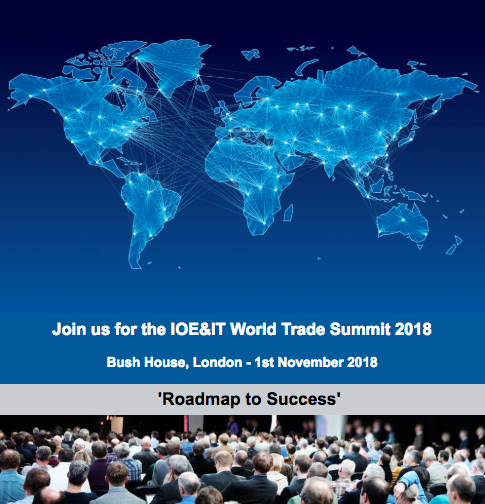
This is an interview with James Binns, Managing Director, Global Head of Trade and Working Capital at Barclays. Barclays are partnering with the Institute for the World Trade Summit in London on November 1st. They will be launching a new research report with the Policy Institute at King's College London, at the summit, looking into the hurdles and opportunities ahead for UK exporters.
You can sign up to attend the World Trade Summit for free here.


As someone who is relatively new to the role of Global Head of Trade & Working Capital at Barclays, what are your main ambitions for the role and what do you see as being the main challenges?
My initial priority has been to immerse myself in the business to learn from my team, our partners across the Bank and of course, our clients. We have achieved a lot in 2018 and I want to continue to build on this in 2019 and beyond.
Barclays has over 250 Trade & Working Capital Product experts, supporting 16,000 businesses in 14 countries across Europe, Americas and Asia. We have clients across all sectors of the corporate, FI and NBFI world and have relationships with some of these in our home market going back more than 300 years.
I need to ensure that we continue to serve the needs of our core client base across UK and our international business, and put the right investment plans in place to digitise and grow our business for the future so we remain relevant to our clients and provide market leading solutions and service.
Barclays are partnering with the IOE&IT on the London World Trade Summit for the third year in a row. Why are events like these so important for the UK’s exporter community?
At Barclays, we are committed to working with the Government and industry bodies to support UK exporters. During the last twelve months we have supported more than 10,000 Barclays clients with international Trade and Sales Finance products.
We are delighted to continue to support the IOE&IT, and the opportunity it provides to discuss a number of key topics and share this knowledge with UK exporters
Can you tell me about the partnership with The Policy Institute at King’s College London and King’s Business School?
At Barclays we are doing some detailed work in partnership with King’s College London to better understand how exporting can help to transform the UK economy. The partnership activity aligns to the recently launched Government strategy to make Britain a ‘21st Century exporting superpower’, and its ambition to increase exports as a proportion of UK GDP to 35%.
The partnership includes research, lectures, debates and dinners with key sector leaders, policy makers and influencers. By working with a range of partners, including the IOE&IT, we aim to really understand the exporting challenge and influence and assist policy makers by coming up with practical solutions.
Our upcoming research report in partnership with The Policy Institute at King’s, will take an in-depth look at how exporting firms across the UK perceive barriers to export growth, how current exporters make use of government and other export support, and importantly how policy can help these firms to improve their export performance.
I’m looking forward to sharing some of the ideas we come up with at the World Trade Summit.
The theme for our World Trade Summits, throughout the country this year, has been ‘Roadmap to Export Success’. To what extent is having a plan vital for overcoming the barriers to export growth? What should this plan include?
With the current geopolitical volatility and increasingly protectionist trade environment, our clients are facing more uncertainty and are looking to us for advice and support; we aim to put the right plans and solutions in place to help support our clients sustain their trading activity through these interesting times.
Recently, we also opened a new Trade Centre, dedicated to helping over 1000 UK businesses to export more of their goods and services each year. Staffed by 30 export and trade product specialists, the new centre works to boost jobs and economic growth, enabling British businesses to start exporting sooner or to sell even more of their products in domestic and overseas markets.
Our research with King’s College is another way in which we are contributing to these plans, proposing policies and ideas on how our clients can continue to trade both domestically and internationally.
Brexit has obviously been the major talking point in all of our summits. To what extent do we need to also remember to look beyond Brexit at other changes and developments taking place in the trade landscape? What are the other major developments in world trade that UK exporters need to prepare for going forwards?
Brexit is a reality and Barclays remains committed to serving our clients in the UK, the EU and internationally. We have established Barclays Bank Ireland and transferred ownership of our European branches to this entity. Barclays Bank Ireland has the same credit rating as Barclays PLC and we are in the process of digitising and building out our European proposition to meet the future needs of our clients.
However, we need to be mindful of the other major trading economies - including the US, China, Germany - and the impact they have on the world trade agenda
There are a number of changes to be aware of, below some of the major themes:
- The Bankers Association for Finance and Trade (BAFT) has revised and updated its English law master participation agreement (MPA) to drive further standardisation in trade transactions and meet the “modern-day requirements” of the industry: https://www.gtreview.com/news/global/trade-finances-new-master-participation-agreement-5-key-changes/
- The International Trade & Forfaiting Association (ITFA) will soon release a set of guidelines to help those involved in supply chain finance assess their financing programmes
- Changes to INCOTERMS, due to come into force on the 1st January 2020
- The increasing need to obtain AEO status, an internationally recognised quality mark for companies whose customs procedures are efficient and compliant, and who can therefore be considered as secure and reliable trading partners. Barclays can offer support and guidance on this: https://www.barclayscorporate.com/insight-and-research/trading-and-exporting/aeo.html
The changing trade landscape could have an impact on companies’ business models and this may require firms to act well in advance. We aim to engage with clients to understand the changes they are undergoing and how we can best support them navigate these uncertainties.



